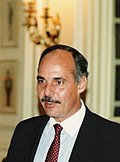| ||||||||||||||||||||
| Registered | 1,834,000 | |||||||||||||||||||
|---|---|---|---|---|---|---|---|---|---|---|---|---|---|---|---|---|---|---|---|---|
| Turnout | 54.70% | |||||||||||||||||||
| ||||||||||||||||||||
 Results by department | ||||||||||||||||||||
| ||||||||||||||||||||
 |
|---|
Presidential elections were held in El Salvador on 19 March 1989. [1] The result was a victory for Alfredo Cristiani of the ARENA party, who secured a majority in the first round. The election marked the first time in Salvadoran history that power was transferred from one democratically elected president to another. Voter turnout was 54.7%. [2]

